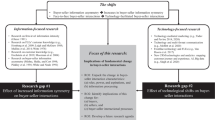Abstract
The goal of this paper is to show that when agents can engage in second-hand trading of information, some agents may not be able to exchange their information with other agents. With three agents, such foreclosure is possible only when agents can refuse to exchange information. With four or more players, foreclosure is possible even when players cannot abstain from or refuse to trade, but it does not constitute a subgame perfect equilibrium. Players can avoid being foreclosed by choosing what to trade and with whom. The results can be applied to formal and informal information sharing, file sharing systems and peer-to-peer networks.
Similar content being viewed by others
References
E. Adar and B.A. Huberman, Free riding on Gnutella, First Monday 5 (2000); http://firstmonday.org/issues/issue5_10/adar/index.html.
P.S. Adler, Market, hierarchy, and trust: The knowledge economy and the future of capitalism, in: The Strategic Management of Intellectual Capital and Organizational Knowledge, eds. N. Bontis and C.W. Choo (Oxford Univ. Press, New York, 2002).
B. Allen, The demand for (differentiated) information, Rev. Econom. Studies 53 (1986) 311–323.
B. Allen, Information as an economic commodity, Amer. Econom. Rev. 80 (1990) 268–273.
K.J. Arrow, Information and Economic Behavior 28, Reprint of Nobel prize (Federation of Swedish Industries, Stockholm, 1973).
K.J. Arrow, Technical information and industrial structure, Industr. Corporate Change 5 (1996) 645–652.
G. Atallah, Information sharing and the stability of cooperation in research joint ventures, Economics Innovation New Technol. 12 (2003) 531–554.
R.J. Aumann and R.B. Myerson, Endogenous formation of links between players and coalitions: An application of the Shapley value, in: The Shapley Value: Essays in Honor of Lloyd S. Shapley, ed. A.E. Roth (Cambridge Univ. Press, New York, 1988).
V. Bala and S. Goyal, A non-cooperative model of network formation, Econometrica 68 (2000) 1181–1229.
M. Bauwens, Peer to peer: From technology to politics to a new civilization? http://noosphere.cc/peerToPeer.html (2002).
M. Chang and J.E. Harrington, Discovery and diffusion of knowledge in an endogenous social network, manuscript (2002).
B.F. Cooper and H. Garcia-Molina, Peer-to-peer resource trading in a reliable distributed system, in: Peer-to-Peer Systems: First Internat. Workshop, eds. P. Druschel, F. Kaashoek and A. Rowstron (IPTPS, 2002).
A. Creane, Risk and revelation: Changing the value of information, Economica 65 (1998) 247–261.
C. d’Aspremont, S. Bhattacharya and L.A. Gérard-Varet, Bargaining and sharing innovative knowledge, Rev. Econom. Studies 67 (2000) 255–271.
P.A. Geroski, Vertical relations between firms and industrial policy, Econom. J. 102 (1992) 138–147.
P. Golle, K. Leyton-Brown, I. Mironv and M. Lillibridge, Incentives for sharing in peer-to-peer networks, manuscript (2001).
S. Goyal and S. Joshi, Unequal connections, manuscript (2002).
H. Haller and S. Sarangi, Nash networks with heterogeneous agents, Discussion paper 337, German Institute for Economic Research, Berlin (2002).
M.O. Jackson, A survey of models of network formation: Stability and efficiency, manuscript (2003).
Y. Katsoulacos and D. Ulph, Endogenous spillovers and the performance of research joint ventures, J. Industr. Economics 46 (1998) 333–357.
Y. Katsoulacos and D. Ulph, Innovation spillovers and technology policy, Ann. Econom. Statist. 49/50 (1998) 589–607.
A.J. Kirby, Optimal information exchange, Inform. Econom. Policy 5 (1993) 5–29.
A. Kopp, Direct communication, networking and localisation of technical knowledge, Kiel Institute of World Economics, University of Kiel (1999).
R.E. Kranton, Reciprocal exchange: A self-sustaining system, Amer. Econom. Rev. 86 (1996) 830–851.
J. Kuipers, On the core of information graph games, Internat. J. Game Theory 21 (1993) 339–350.
J. Larrosa and F. Thomé, Network formation with heterogeneous agents, manuscript (2003).
S. Macdonald, Information networks and the exchange of information, in: The Economics of Information Networks, ed. C. Antonelli (North-Holland, New York, 1992).
T. Moreton and A. Twigg, Trading in trust, tokens, and stamps, manuscript (2003).
S. Muto, An information good market with symmetric externalities, Econometrica 54 (1986) 295–312.
T.J. Ngan, D.S. Wallach and P. Druschel, Enforcing fair sharing of peer-to-peer resources, manuscript (2002).
J. Poyago-Theotoky, A note on endogenous spillovers in a non-tournament R&D duopoly, Rev. Industr. Organization 15 (1999) 253–262.
M. Rabin, Incorporating fairness into game theory and economics, Amer. Econom. Rev. 83 (1993) 1281–1302.
B. Raghavan and A.C. Snoeren, Priority forwarding in ad hoc networks with self-interested parties, manuscript (2003).
M. Raith, A general model of information sharing in oligopoly, J. Econom. Theory 71 (1996) 260–288.
K. Ranganathan, M. Ripeanu, A. Sarin and I. Foster, To share or not to share: An analysis of incentives to contribute in collaborative file sharing environments, manuscript (2003).
R.L. Reynolds and C. Skoro, Reciprocity, redistribution and exchange in US management thought, Internat. J. Social Economics 23 (1996) 3–20.
E.M. Rogers, Information exchange and technological innovation, in: The Transfer and Utilization of Technical Knowledge, ed. D. Sahal (Lexington Books, Massachusetts, 1982).
E.M. Rogers and J.K. Larsen, Silicon Valley Fever: Growth of High-Technology Culture (Basic Books, New York, 1984).
S. Schrader, Informal transfer of technical information between companies: Framework and empirical analysis into engineers’ decisions, Working paper, Munich University (1988).
S. Schrader, Informal alliances: Information trading between firms, Adv. Global High-Technol. Managm. 5 (1995) 31–55.
C. Shapiro, Exchange of cost information in oligopoly, Rev. Econom. Studies 53 (1986) 433–446.
X. Vives, Duopoly information equilibrium: Cournot and Bertrand, J. Econom. Theory 34 (1984) 71–94.
X. Vives, Trade association disclosure rules, incentives to share information, and welfare, RAND J. Economics 21 (1984) 409–430.
Author information
Authors and Affiliations
Corresponding author
Rights and permissions
About this article
Cite this article
Atallah, G. Indirect information exchange. Netnomics 6, 119–151 (2004). https://doi.org/10.1007/s11066-004-5086-8
Issue Date:
DOI: https://doi.org/10.1007/s11066-004-5086-8




